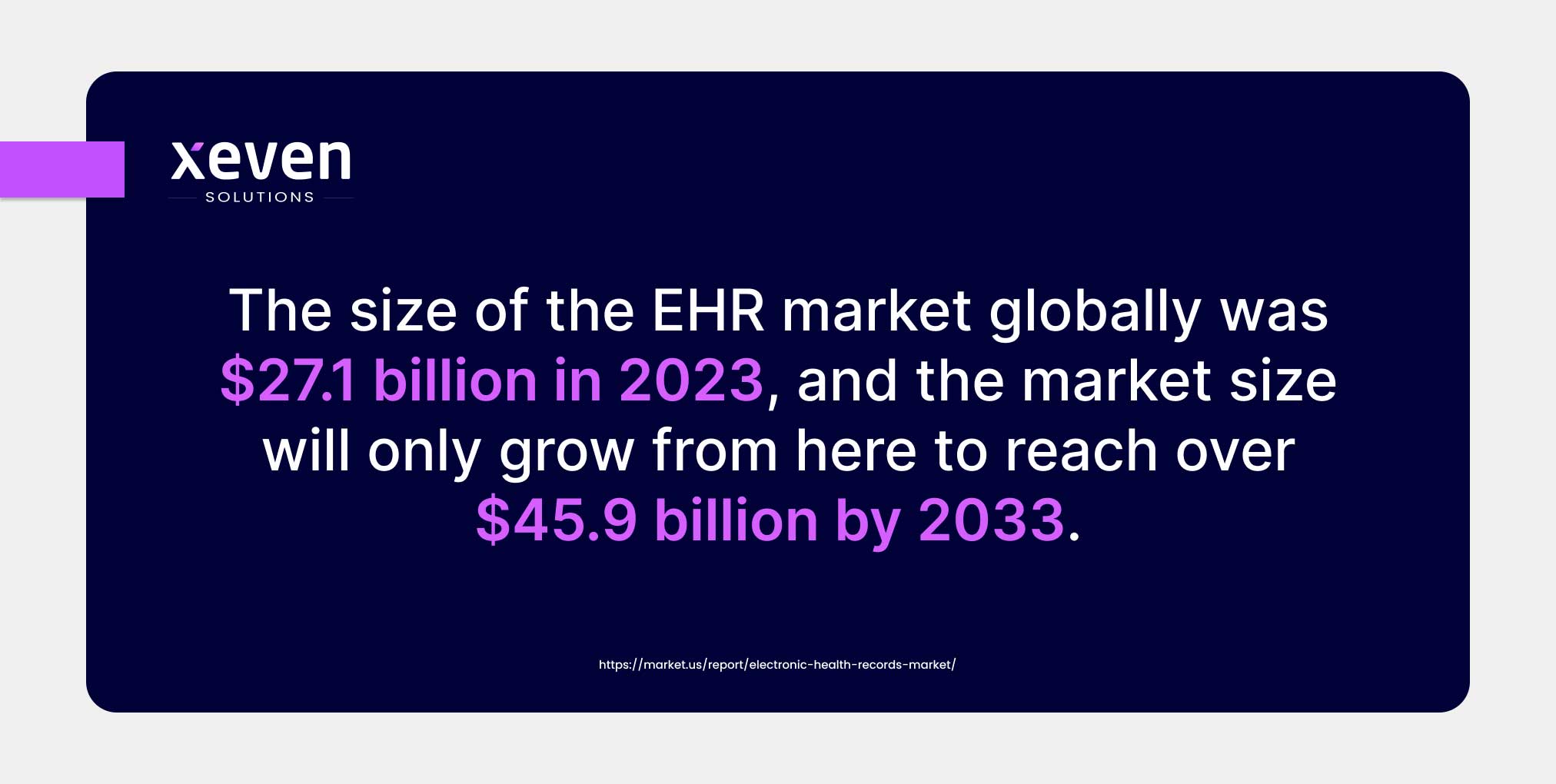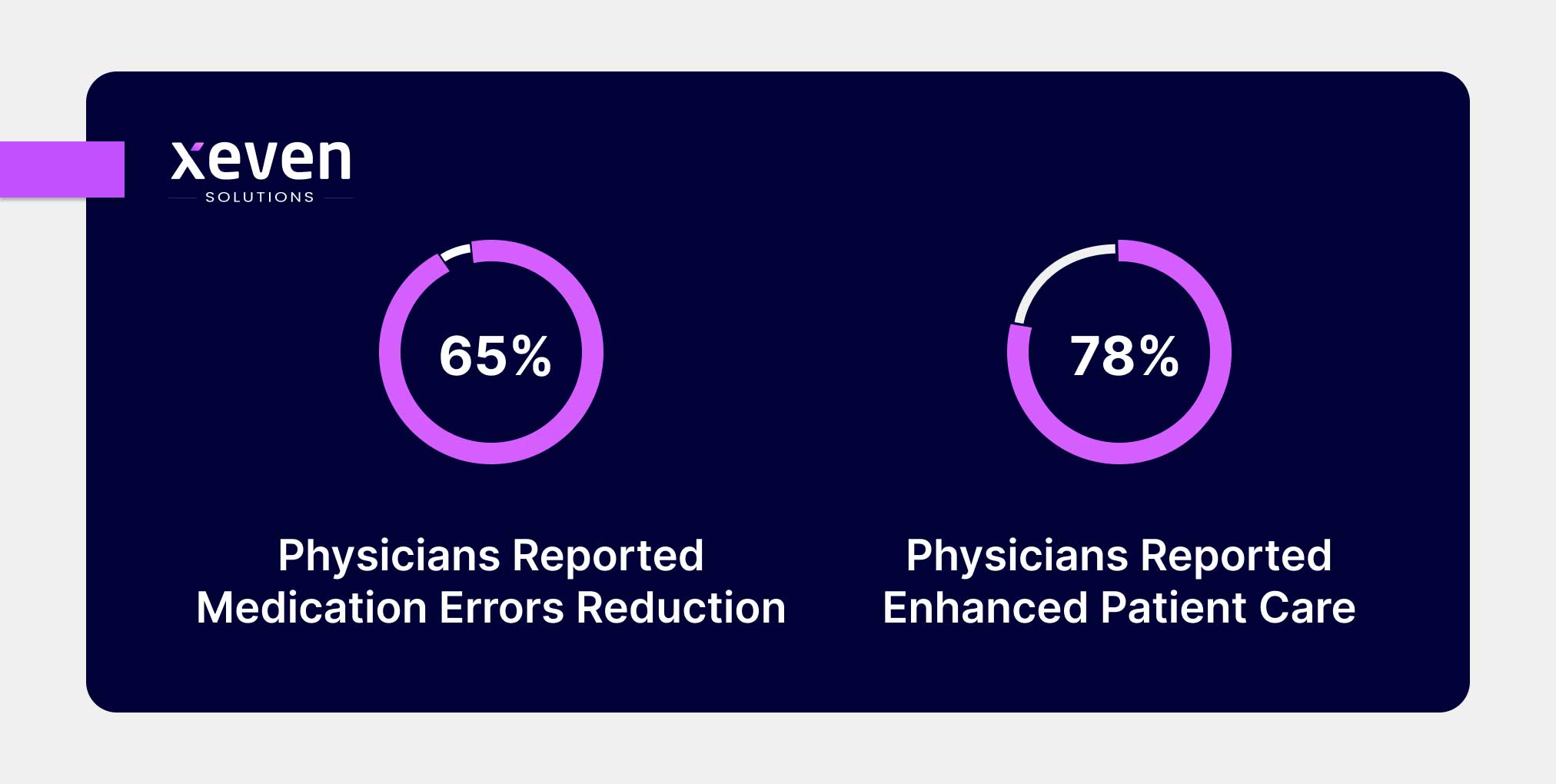![EHR Software Development [Things to Consider in 2024]](https://www.xevensolutions.com/wp-content/uploads/2024/09/EHR-Software-Development-Things-to-Consider-in-2024.jpg)
![EHR Software Development [Things to Consider in 2024]](https://www.xevensolutions.com/wp-content/uploads/2024/09/EHR-Software-Development-Things-to-Consider-in-2024.jpg)
September 30, 2024
The healthcare industry is one of the many sectors influenced by technological advancements. Modern healthcare technologies have reshaped how caregivers serve patients’ needs. Some notable technologies include EHR solutions, wearable AI technologies, and many more.
Today, we are going to discuss EHR software development in detail, what benefits it has to offer, things you must consider when building EHR systems, and many more exciting things. But before we jump into the topic, let’s understand its importance, as highlighted by the statistics.
A report from Market.us reveals that the size of the EHR market globally was $27.1 billion in 2023, and the market size will only grow from here to reach over $45.9 billion by 2033. This indicates the strong demand for and increasing adoption of EHR software solutions worldwide.

EHR software development is the comprehensive process of building an electronic health record (EHR) system. It includes everything from requirement analysis to EHR system development to successful deployment.
An EHR is a digital version of comprehensive patient health information and medical records. A healthcare provider can easily store, manage, and share these records in real-time with authorized persons. It includes information about patient demographics, allergies, vital signs, treatment history, lab results, etc.
EHR improves patient care, increases workflow efficiency, and helps reduce costs by automating routine tasks and reducing errors.
No one wants to simply go for any EHR system and think that it will do the intended job. Do you? Undoubtedly, there are numerous benefits of EHR systems. However, it is crucial to understand the different types and must-have features of EHR solutions to get the most out of them for your organization. Here are three different types of EHR systems:

You might have used a cloud-based storage server such as Google Drive, where data is stored and accessed remotely. The same is the case with cloud-based EHR systems, where data is stored remotely and accessed using the internet.
It is one of the most popular types of EHR software that most healthcare providers utilize to manage patient data. Here, it is necessary to know that the system must comply with HIPAA and GDPR to protect your data.
Cloud-based EHR solutions are affordable, provide access to only authorized persons, and often come with SaaS capabilities to improve workplace efficiency.
As the name suggests, it is an EHR system that stores complete data on the physician’s server. The most important thing to know here is that in this type of EHR, the physician or the organization has to bear all the costs of hardware, software, and maintenance.
If you are a large organization that can afford heavy costs, this EHR is best for you. It gives you full control of data and allows for prompt updates. However, for SMEs, it is not the ideal option because it requires a complete team to maintain the system continuously and costs too much.
In this EHR system type, the data is stored on a third-party server. Providers have to access the data via the internet. It gives physicians a bit of relief and empowers them to focus on delivering the best patient care because they are not responsible for managing or maintaining the server.
This type of EHR solution is cost-effective and more suitable for SMEs. However, if you want to take control of the server maintenance to avoid unexpected downtimes, you should look for alternative options.
Physicians reported that EHR systems help them enhance patient care by 78% and reduce medication errors by 65%. Surely, you don’t want to miss these for your healthcare practice. Do you? If you have made up your mind to leverage these and numerous other benefits of EHR development, you must consider these important factors:

The first and foremost thing that you need to do is partner with a reliable EHR software development company. The things that you must look for are their experience and proven track record of building EHR software systems.
You must look for client testimonials that will give you a hint of how they deal with their clients and the level of importance they place on customer satisfaction. Moreover, you should access the skills and technological understanding of their healthcare software developers. Considering these aspects will help you picture the future of your product and your practice.
Having a web app for EHR is a necessity, but what makes it even is having a mobile app. A mobile EHR app allows patients to connect with patients more conveniently. Moreover, you can access, update, and manage patient records from anywhere.
Mobile EHR apps also increase patient engagement by empowering them to access their health records, schedule appointments, and receive reminders. However, you must ensure that the mobile app is secure and user-friendly. The mobile app should offer features like appointment scheduling, patient history viewing, and updating data in real-time.
Interoperability is one of the most crucial factors you must consider. Without interoperability, you won’t get the results you desire to achieve using EHR systems. Interoperability allows you to seamlessly share patient data with other healthcare systems without worrying about data security.
Interoperability improves care coordination among providers, which leads to better patient outcomes. I recommend you ensure that your system adheres to industry standards for data exchange, such as HL7.
As there are multiple industry standards for secure data sharing, there are numerous standards that make your system secure and protect sensitive patient data. These international standards include HIPAA in the United States and GDPR in Europe.
Apart from securing data, compliance with these standards helps you avoid legal and financial penalties. So, when choosing an EHR system, look for whether it complies with these standards.

Surely, you don’t want to lose your current healthcare data, whether administrative records or patient health records. Data migration is a process of transitioning data from your legacy systems into the new EHR system without data loss or corruption.
However, effective data migration requires you to follow several steps carefully. It includes planning, testing, and validation to guarantee that all essential information is completely and accurately transferred.
Your budget is the last thing you must consider when building or choosing an EHR system. Undoubtedly, it’s crucial to seek maximum value from your investment; it’s equally important to weigh the financial implications.
It is unwise to pour your entire budget into an EHR system if you cannot cover your staff’s salaries for the rest of the year. Assessing your needs, choosing an affordable vendor, and considering financial implications before building an EHR software system is highly recommended. Remember, the most expensive option isn’t always the best fit.
It is highly unlikely that anyone can determine the exact cost of EHR software development. There is a reason behind why I said this. It is because it depends on multiple factors, including requirements, features, the development team you select, tools & technologies, and more.
I recommended getting in touch with an EHR development company to share your needs and get the exact cost of developing an EHR software solution. However, a rough estimation is that an EHR system with basic functionality can cost you up to $50,000 and a more complex one up to $400,000.
Xeven Solutions is trusted by hundreds of healthcare providers as their first choice for healthcare software solutions, especially EHR solutions. We have 10+ years of experience and a team of well-versed engineers who focus on addressing your healthcare challenges with modern EHR software solutions, all while keeping your budget in mind.
We have the right skills and understanding of technology that make us the perfect partner for secure and HIPAA-compliant EHR software development. Simply get in touch with our EHR experts, and we’ll work together to develop an EHR system that fits your goals.